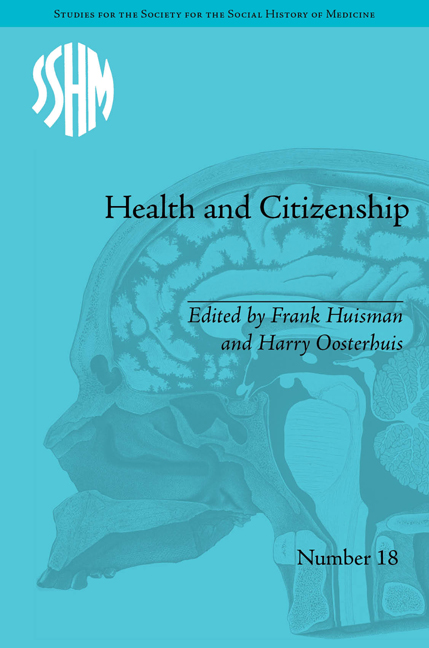Book contents
- Frontmatter
- CONTENTS
- Acknowledgements
- List of Contributors
- The Politics of Health and Citizenship: Historical and Contemporary Perspectives
- Part I Liberal Citizenship and Public Health
- Part II Social Citizenship: Health in the Welfare State
- Part III Neo-Republican Citizenship: Health in the Risk Society
- Notes
- Index
Part I - Liberal Citizenship and Public Health
- Frontmatter
- CONTENTS
- Acknowledgements
- List of Contributors
- The Politics of Health and Citizenship: Historical and Contemporary Perspectives
- Part I Liberal Citizenship and Public Health
- Part II Social Citizenship: Health in the Welfare State
- Part III Neo-Republican Citizenship: Health in the Risk Society
- Notes
- Index
Summary
After the French Revolution had proclaimed the principles of liberty, equality and fraternity, it was up to post-revolutionary generations to take a stance towards them. This section is concerned with the dilemmas of liberal citizen-ship, in relation to developments in (public) health care during the nineteenth and early twentieth century. All four chapters are about the relationship between citizens and the state in a period in which Europe was going through profound social (industrialization) and political (democratization) changes. Over the course of the nineteenth century, liberal democracy gradually took shape and the first contours of public health in industrial society appeared. Inherent tensions between liberal-democratic principles troubled the relation between health and citizenship. Each of the chapters discusses the contradictions within liberalism with respect to state intervention, the role of medicine in society and the protection of individual rights. Their common focus is the problem of reconciling freedom and distributive justice.
Matthew Ramsey outlines the tension between the promises of the French Revolution with respect to public health care and the liberal aversion to direct intervention by the state in society. Among other things, the constitution of 1791 had promised a broad system of public assistance, but the liberal respect for individual autonomy, private property and free enterprise hampered the enactment of compulsory legislation. Two major projects – one on poor relief and the other on medicine – sought to make medical assistance available to the poor.
- Type
- Chapter
- Information
- Health and CitizenshipPolitical Cultures of Health in Modern Europe, pp. 41 - 44Publisher: Pickering & ChattoFirst published in: 2014

